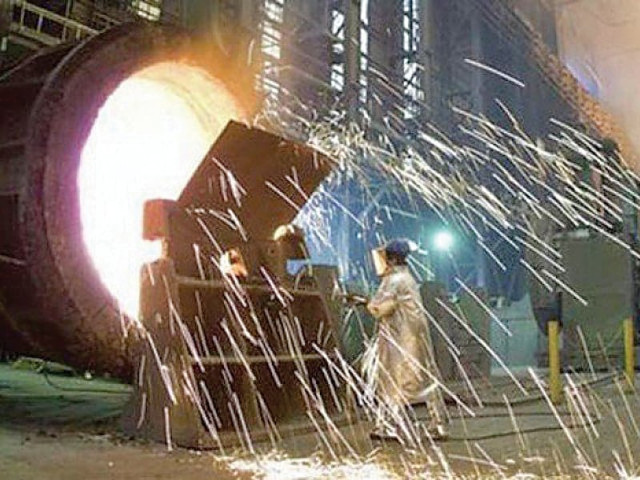Aisha Steel Mills’ plans to expand are all ‘laid out’
Company CEO says anti-dumping duty on Chinese steel has spurred investment.

The imposition of anti-dumping duty on Chinese and Ukrainian steel has given a new life to the local producers. photo: file
The company, which has a current nameplate capacity of 220,000 tons per annum, had earlier announced to expand production to 700,000 tons in the first phase, which is expected to be completed in the next 18 months. Aisha’s total investment for the endeavour is Rs5.4 billion (about $50 million).
With the roadmap clear, the CEO said that expansion plans are intact as he foresees greater demand amid a booming construction sector.
“We have already laid out plans for further expansion to 850,000 tons per annum,” he said, “However, the plans are yet to mature completely.” Its only rival in the market, International Steels Limited (ISL), has been continuously expanding in recent years. The company is looking to increase its overall cold-rolled coils (CRC) capacity to 1 million tons at an investment of Rs5.6 billion (about $52 million) in the next one year.
Currently, Pakistan’s estimated CRC market size is about 600,000 tons per annum. Together with ISL, Aisha Steel meets about 50% to 60% domestic demand while the rest is imported from dozens of countries all over the world.
The total demand of galvanised iron (GI) – another type of flat steel that has a zinc coating to protect it from rust – is also close to 600,000 tons per annum, taking cumulative demand of flat steel in the country to 1.2 to 1.3 million tons per annum. Like ISL, Aisha Steel is also going to produce GI. Out of the total capacity of 700,000 tons per annum, CRC’s share would be 450,000 tons while the rest 250,000 tons will be for GI.
Aisha Steel Mills posts profit of Rs1.01b
Anti-dumping duty spurs new investment
The imposition of anti-dumping duty on Chinese and Ukrainian steel has given new life to the local producers – International Steels Limited (ISL) and Aisha Steel – of cold-rolled coils (CRC) in the country.
“We were in the process of expansion, but yes we expedited everything after the imposition of anti-dumping duty in January 2017,” he commented on the positives of imposition of duty.
Both, ISL and Aisha Steel, announced large expansion plans after the imposition of anti-dumping duty.
Pakistan only placed 10% to 19% anti-dumping duty on Chinese CRC producers, which was still very low compared to many other countries that slapped up to 100% duties on Chinese companies to save their domestic players from collapse, he added.
China has an installed capacity of over 800 million tons of steel per annum and is, by far, the largest steel producer in the world. Its nearest competitor Japan produces a little over 100 million tons of steel a year.
With government subsidies, Chinese steel companies grew phenomenally in the last few decades to meet the country’s extraordinary infrastructure requirements. However, due to economic slowdown in domestic market in recent years, these companies started dumping their stocks in different countries that ultimately prompted governments to slap anti-dumping duties on their products.
Smuggling subsides significantly
According to industry officials, the industry was facing up to Rs30 billion annual smuggling three to four years ago. However, smuggling that was primarily being done through Iran, has now reduced to a great extent providing a huge relief to the industry.
“We do not find it [smuggling] a big threat now as this has been more or less stopped,” he said.
He, however, said that misdeclaration in secondary steel (a notch below the best quality steel) must have been going on because people tend to import primary steel (top quality steel) under the garb of secondary to save on import duties. This (misdeclaration) not only hurt the interests of local industry, but also dent government’s income in taxes.
Aisha Steel Mills' earnings soar 501%
Impact of CPEC
Unlike long steel products and cement, our products are not directly going to consume in mega infrastructure project that are undergoing under the CPEC.
“CPEC is going to help us indirectly because we do not produce finished consumer items,” he said.
One of the major impacts of CPEC is that it is expected to increase economic growth in Pakistan. Due to better economic growth, people will buy more cars, refrigerators, air conditioners, motorcycles, tractors – major industries that use CRC as a main input – and this is how the CPEC is going to help CRC producers, added Ahmed.
Analysts expect steel demand in Pakistan will rise at a faster rate in coming years due to healthy economic growth in the country. The country achieved 5.3% GDP growth rate – highest in a decade – in fiscal year ending on June 30, 2017. According to the World Steel Association (WSA), Pakistan’s total steel use in 2015 was 7.1 million tons (including long and flat products), which translates in to a per capita use of just 37.5kg – one of the lowest in the world.
Topline Securities expects the country’s steel requirement to grow over 12 million tons by 2019, taking per capita requirement to 62kg.
the writer is a staff correspondent
Published in The Express Tribune, October 23rd, 2017.
Like Business on Facebook, follow @TribuneBiz on Twitter to stay informed and join in the conversation.


















COMMENTS
Comments are moderated and generally will be posted if they are on-topic and not abusive.
For more information, please see our Comments FAQ